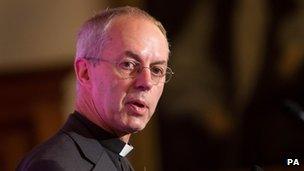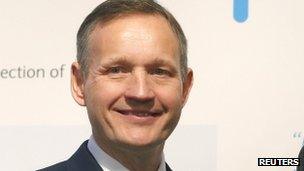Archbishop of Canterbury Welby warns of bankers 'lynch mob'
- Published

Archbishop Welby admitted feeling sympathy for bankers
The Archbishop of Canterbury has described the naming and shaming of bankers in the wake of the financial crisis as "lynch mobbish".
The Most Reverend Justin Welby admitted sympathy for former bankers when hearing evidence as a member of the Banking Standards Commission.
He admitted "thinking, 'I'm not sure I would have been very different,' rather than thinking how bad they were".
But he also said some senior bankers had tried to avoid accountability.
"Certainly one of the trends that has been very unfortunate, to put it mildly, is that in some financial services companies there was a clear policy of not telling the top people - they made sure they weren't told things - because then they could plead ignorance, and that's just unacceptable.
"But this business of somehow saying that one individual bears the whole blame as opposed to simply the accountability - it feels lynch mobbish," he said.
Archbishop Welby was an oil executive before becoming a priest.
He was speaking to the Bishop of Liverpool, the Right Reverend James Jones, as part of the BBC Radio 4 series The Bishop and the Bankers, in his first public comments since the commission published its report on banking standards, external last month.
'Edgy'
The commission heard evidence from current and former senior bankers involved in the financial crisis.
Its report recommended that bankers found guilty of reckless conduct should be jailed, and warned that bankers at senior levels had "operated in an environment with insufficient personal responsibility".
When asked about the naming and shaming of bankers, Archbishop Welby told the BBC he felt "very edgy indeed", and referred back to his experience as an oil trader.
He described the buzz and fun of closing a deal as well as the tensions he experienced around the values of the business world.
"What I remember is the sense that the culture and values of the financial world enveloped you and began to shape one into a new ethical shape," he said.
"You were aware that you were struggling with this and often rather frightened by what was going on."
In contrast, the Church, he said, had been "the mould that was shaping me correctly and strengthening me not to be reshaped by the culture I was working in".
'Power of context'
Johnny Cameron was head of the investment banking division at Royal Bank of Scotland when the bank had to be rescued by the government in 2008.
In 2010 he was barred from working in the City again after the Financial Services Authority ruled that he did not meet the required standards for a senior banker.

Barclays chief Antony Jenkins says the biggest driver of change needs to come from the banks
Mr Cameron told Bishop Jones: "People underestimate the power of the context in which one sits. I certainly felt this can't go on forever, but I never thought it would end in the crisis it ended in.
"The people in the bank weren't different from the people sitting next to them on the train as they commuted in - everyone thought it was onwards and upwards, and what fun this is.
"And it's incredibly difficult if you are at the front line to see the excesses at the time."
The chief executive of Barclays, Antony Jenkins, spoke to Bishop Jones just before the Banking Standards Commission's report was published, but says his comments still stand.
He argued that many people in the banking industry had already paid a price for their failures.
"While I understand the sentiment that people should be sent to prison for what's happened, the question is, what is the offence?" he asked.
"The biggest driver of change in the behaviours of banks has to come from within the banks themselves - they have to come to a realisation that they will be better businesses commercially and ethically if they change their behaviour.
"If we want to create a criminal offence of negligence within the financial services industry that is a question for society. I am not convinced that that would solve the problem.
"I think the biggest solution is the way that banks are led and the culture that exists within them."
The first episode of the three-part series, The Bishop and The Bankers, will be broadcast on Monday, 22 July at 20:00 BST on BBC Radio 4, external. You can listen again via the BBC iPlayer.
- Published8 July 2013
- Published19 June 2013